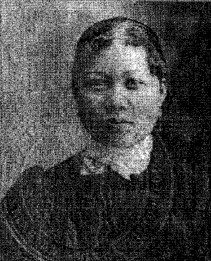In 1899, Ah Sou, a Chinese orphan, was sold to a man named Moy Sam with the belief that she would accompany him to the United States of America to become his daughter. There are no records indicating why or how she was sold. After her trip across the Pacific Ocean, she landed at Port Townsend, Washington, on August 23, 1900, and discovered that she would be forced into prostitution.1 Despite learning this, she followed the orders she was given, and told immigration inspectors at the entry port that Moy Sam was her father and a merchant.

After enduring three years of abuse from Moy Sam, she overheard that she was about to be sold to another man for further exploitation. She decided that she needed to act fast before being sold, and found a way to escape in November of 1903 to The Home for Chinese Women and Girls. Reverend William Holt and his wife, Frances Holt, unintentionally founded the home in Portland, Oregon after serving as American missionaries in China. It began with one Chinese woman who sought refuge with Reverend and Mrs. Holt; not long after, more women followed her lead. Eventually, the home, located at 350 Fourteenth Street, was opened in April 1889.2
There was a Board of Directors of the Home in Portland, which gave it a certain degree of legitimacy. The home taught the women how to speak English, as well as how to read English and Chinese. They were educated in various skills, such as housework, needle-work, and Bible studies. Mrs. Holt said, “They eat Chinese food, wear Chinese clothes, except the shoes, have very plain furniture in their rooms, and are led to look forward to such lives as respectable, intelligent Chinese women may hope to enjoy. The purpose is not to make them over into American women, which might end in dissatisfaction and unhappiness by and by, but we want them to develop into good, useful Chinese women.”3 The home was such a success that a deaf-mute girl, who was raised there, gave a speech at a board meeting, gesturing, “More love to thee.”4

While Ah Sou was at the home, she was the only girl there, which made the days long and boring for her. While she was there, she was married by Reverend Holt to a Chinese man named Lum Kong, because they believed that he was a Chinese merchant. That was important, because being married to a Chinese merchant meant that Ah Sou would be able to legally stay in America. After a number of weeks, Ah Sou made it very clear that she wanted to leave the home, because being the only girl there made her feel very lonely. Frances Holt and the staff did not like the idea of her leaving. Mrs. Holt said, “We wished [Ah Sou] to stay, we did everything we could to persuade her to stay, we hoped she would stay with us for a year or more and it was [Lum Kong’s] wish that she stay, but she said she did not want to, she preferred to leave.”5 Although Lum Kong wanted Ah Sou to stay, he did nothing to keep her from leaving because their marriage did not mean much to him. He knew that the sole reason for their marriage was to try to legalize her status in the United States.
After she left the home, Ah Sou traveled to Seattle where she ran into Moy Sam, who was cooperating with law enforcement to have her arrested. On January 1, 1904, she was arrested by an immigration inspector, and on January 8, 1904, Commissioner James Kiefer ordered her to be deported to China. In between her apprehension and the deportation order, there was a lengthy hearing at which a number of witnesses testified. These witnesses included: the immigration inspectors who arrested and interviewed Ah Sou, a baggageman for the Northern Pacific Railroad who knew Moy Sam, the photographer who helped Moy Sam create a fake family photograph, Mrs. Holt, the employer of Lum Kong, and Lum Kong. When Ah Sou was asked about her time with Moy Sam she said, “I was whipped and beaten by [Moy Sam]. Every day I was beaten by him with sticks of wood until I was black and blue.”6 She also informed the court that she never received any of her earnings during her time with Moy Sam. At the end of the hearing, it was decided that the only reason for Ah Sou’s marriage was so that she would not be deported, thus making her deportable. She was seen as nothing more than an illegal immigrant turned prostitute. However, Ah Sou refused to give up and appealed the deportation order to the United States District Court for the District of Washington, where Judge Cornelius Hanford presided over her appeal.

Although Judge Hanford’s further investigation led him to find out that Lum Kong was not actually a merchant, and he agreed that Ah Sou’s marriage was not bona fide, he still decided to reverse the deportation order. Judge Hanford stated, “The laws excluding Chinese immigrants and women imported for immoral purposes require the court to cause a person in the situation of the appellant to be deported to China. Compliance with the statute in this case will be, in my estimation, a barbarous proceeding, for it will be equivalent to remanding the appellant to perpetual slavery and degradation.”7 He also emphasized Ah Sou’s great effort to escape Moy Sam and create a life for herself. He stressed that the Thirteenth Amendment prohibits slavery and that the only way she could be emancipated was if she was released from custody and allowed to remain in America. Unfortunately, the government appealed Judge Hanford’s decision to the United States Court of Appeals for the Ninth Circuit.
Ah Sou argued that the court did not have any right to her case, and said, “[The] sole question involved is the application of the thirteenth amendment to the Constitution of the United States, and that therefore the appellate jurisdiction of the Supreme Court is exclusive.” However, the Judiciary Act of 1891 gave the Supreme Court exclusive jurisdiction over “the construction or application of the Constitution of the United States.”8 This court ruled, “We see no escape from the conclusion that the judgment of the trial court must be reversed, and the appellee remanded to the country whence she came.”9 Ah Sou tried appealing this ruling to the Supreme Court, but her appeal was denied for lack of jurisdiction. On March 8, 1906 Ah Sou was placed aboard a steamer named “Manchuria,” and left San Francisco for Hong Kong, China. That is where her records end; nothing more was heard of Ah Sou.10
Unfortunately, there are many other stories just like Ah Sou’s, where young girls are sexually exploited and are seen as nothing more than illegal immigrants. More recently, the Trafficking Victims Protection Act of 2000 has been created to help persons trafficked and ensure that traffickers face adequate consequences. This act ensures that governments have recovery centers that provide medical treatments to heal the physical and mental abuse that victims endure. Yet there are still instances like Ah Sou’s that have holes and gaps in their journey that may never be discovered, as sex-trafficking victims are only provided minimal care so that some governments can say that they are doing their job to make sure the victims are accounted for.11
It is not shocking that a Chinese orphan was so easily tricked into being trafficked. Sex trafficking is still a global issue, but is especially prevalent in China. During China’s early years of economic liberalization, sex establishments were operated in the Special Economic Zones. These establishments catered to everyone–clients ranged from local businessmen to foreign investors. The sex-trafficking industry is so common in China, that every major city has a red-light district, which is where sex establishments congregate to make it easier for people to locate them.12 If you or anyone you know is being sex-trafficked or at risk, the National Human Trafficking Hotline is +1 (888) 373-7888. They have translators that speak over 200 language who are available 24/7. If you would like to send them a message, text “HELP” or “INFO” to 233733. For more information please visit https://humantraffickinghotline.org/.13
- Margaret McKeown and Emily Ryo, “The Lost Sanctuary: Examining Sex Trafficking Through the Lens of United States v. Ah Sou,” Cornell International Law Journal 41, no. 3 (2008): 748. ↵
- Margaret McKeown and Emily Ryo, “The Lost Sanctuary: Examining Sex Trafficking Through the Lens of United States v. Ah Sou,” Cornell International Law Journal 41, no. 3 (2008): 749. ↵
- Margaret McKeown and Emily Ryo, “The Lost Sanctuary: Examining Sex Trafficking Through the Lens of United States v. Ah Sou,” Cornell International Law Journal 41, no. 3 (2008): 750. ↵
- David Livingstone, “What Japanese Christian Women are Doing for Korea,” Woman’s Work 48, no. 3 (1913): 165. ↵
- Margaret McKeown and Emily Ryo, “The Lost Sanctuary: Examining Sex Trafficking Through the Lens of United States v. Ah Sou,” Cornell International Law Journal 41, no. 3 (2008): 751. ↵
- Margaret McKeown and Emily Ryo, “The Lost Sanctuary: Examining Sex Trafficking Through the Lens of United States v. Ah Sou,” Cornell International Law Journal 41, no. 3 (2008): 749. ↵
- Margaret McKeown and Emily Ryo, “The Lost Sanctuary: Examining Sex Trafficking Through the Lens of United States v. Ah Sou,” Cornell International Law Journal 41, no. 3 (2008): 753. ↵
- Margaret McKeown and Emily Ryo, “The Lost Sanctuary: Examining Sex Trafficking Through the Lens of United States v. Ah Sou,” Cornell International Law Journal 41, no. 3 (2008): 754-755. ↵
- Margaret McKeown and Emily Ryo, “The Lost Sanctuary: Examining Sex Trafficking Through the Lens of United States v. Ah Sou,” Cornell International Law Journal 41, no. 3 (2008): 755. ↵
- Margaret McKeown and Emily Ryo, “The Lost Sanctuary: Examining Sex Trafficking Through the Lens of United States v. Ah Sou,” Cornell International Law Journal 41, no. 3 (2008): 755. ↵
- “2018 Trafficking in Persons Report” (Department of State, June 2018), 4,39 https://www.state.gov/documents/organization/282798.pdf. ↵
- Bonny Ling, “Human Trafficking and China: Past and Present” (Thesis, National University of Ireland Galway, 2014), http://hdl.handle.net/10379/4730. ↵
- “National Human Trafficking Hotline,” National Human Trafficking Hotline, accessed April 6, 2019, https://humantraffickinghotline.org/node. ↵



55 comments
Nathalie Figueroa Soto
I really like how this article told the story of Ah Sou, and then tied it up and ended it with explaining that human trafficking stories like hers are still happening today. She was seen as nothing more than a Chinese immigrant turned prostitute, not as a human with the right to stay in the U.S. She pleaded with multiple courts to let her stay, and yet she was turned down every time. Reading about how the last records we have of her were of her getting on the ship back to Hong Kong, China were hard to read, as we don’t know what became of her next. Really great and informative article.
Maya Mani
I feel so bad for Ah Sou, as well as the many other victims of sex trafficking. It always saddens me to read about these types of cases, and unfortunately Ah Sou’s case was no different. All she wanted was opportunity, but instead she was sexually, physically, and verbally abused. I wish that her deportation wasn’t the go-to solution, and it’s truly sickening because it was probably seen as the most convenient solution.
Makenzie Santana
It is tragic knowing that instead of showing kindness, Ah Shou was sent away without any regards to her well being. I believed that with everything she had been through in her live already she didn’t deserve this kind of treatment. She was beaten and sold and had no real piece in her life and it angers me that Moy Sam, a terrible man, got away with what he had done to her and help aid the process of her deportation.
Tyler Reynolds
I like the straightforward introduction to topic of the article. I also appreciate the usage of diaries and testimony to the article. Reading this article reminds me of the current state of America, and much of the western world, when it comes to deportation and migration. Thanks to the mergence of social media, it has become possible for hundreds to become informed of and rally behind a person who is about to be deported.
Christopher Hohman
Nice article. It is so terrible to learn of the life of Ah Shou. I wish that people would have been more kind to her and that she would have been allowed to remain in the U.S. It is terrible that we sent her back despite knowing what would probably happen to her when she returned to China. I think this article speaks a lot to a more pressing and equally tragic episode playing out at our border right now. I wish that we could show these people the kindness that they deserve.
Rosario Moreno
This breaks my heart, it is so sad that sex trafficking continues and that woman and girls, even boys have to continue being put into this predicament. I hated reading about the overturning of Ah Sou’s case, so much could have been changed. Your article brings truth into what really happens and even though it is heartbreaking people need to be aware. Thank you, great article!
Mia Morales
Being a woman, sex trafficking is one of my greatest fears. My heart always aches reading about cases like this, and I think it’s important for more people to know about what is really happening to these girls and find more ways to put an end to it. What happened to Ah Sou breaks my heart, it is saddening to see when the courts fail to protect the ones in need.
Auroara-Juhl Nikkels
I had never heard of this girl’s life before. It is so sad how she almost never caught a break, being bought, sexually abused, running away, getting arrested, and being deported. I wish we knew what happened to her after she was deported and I hope that she found happiness back in China.
Engelbert Madrid
It is unfortunate that many women are sold in sex trafficking around the world, especially in countries where the government is weak and corrupted. Reading about Ah Sou’s court case and how it was overturned is truly disappointing, because Ah Sou could have been saved from prostitution in the United States; however, the help and support from the country was not given. I think it’s essential to help people in need and that are looking for refuge in another place, because basic human rights should not be abused.
Danielle Slaughter
My heart hurts for Ah Sou, as well as all other victims of sex trafficking both past and present. What a wonderful thing you did by incluing resources for potential victims to contact for help. It is unfortunate that so many young girls and boys are trapped in this modern-day slavery, and many of us will not rest until it is halted in all its forms. It is also shameful that Ah Sou was deported after all, instead of the courts taking the time to really process her story.